Best Ways to Clean Retainers Naturally
Wear dental retainers? Find out how to clean them naturally without harsh chemical cleaners, yet effective against bacteria, plaque, and more. Learn the best ways to clean retainers naturally to increase their lifespan and maintain your oral health.
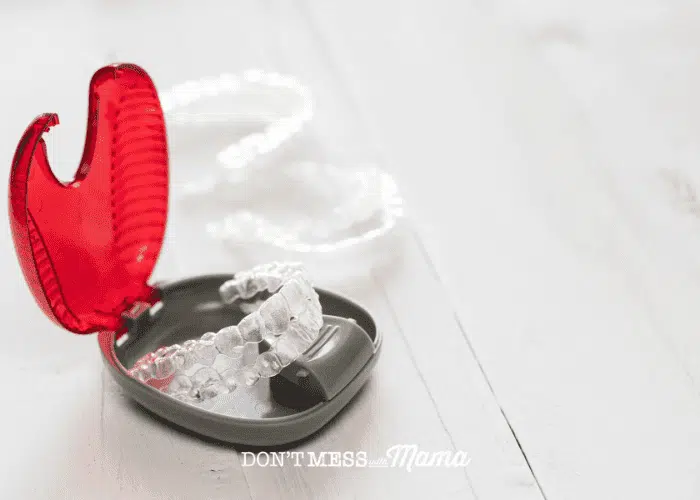
This post contains affiliate links. Please read my affiliate disclosure.
I’m not a doctor or health care professional, and this is not medical advice. This post is for educational purposes only, and you should follow up with your doctor for more information.
Do you wear retainers? You may not realize that there’s bacteria, tarter buildup and plaque on your retainers, and if not cleaned properly they’ll eventually end up back in your mouth. Gross right?
That’s why cleaning your retainers regularly is important. But, you can use any cleaner to do it. I’ve got tips on how you can do it with simple, natural ingredients they will save you money, all while avoiding abrasive ingredients and harsh chemicals.
Why Clean Your Retainers?
It’s not just about keeping your orthodontist happy, but also about taking care of your oral health. You might even be thinking, “Isn’t a quick rinse enough?” While a rinse with water might remove some surface debris, it won’t do the deep cleaning your retainers need. It only takes a few minutes to clean retainers anturally, but the payoff is huge. It won’t just save you money and time but it will also increase their lifespan.
Here are a few more important reasons why you should clean your retainers:
- Avoid tartar buildup: You know that stubborn yellowish buildup that forms on your teeth if you fail to brush properly? Well, that can happen to your retainers too, if you don’t clean them regularly. Tartar can be tough to remove once it sets in, so it’s important to stay on top of cleaning.
- Remove Plaque: Often confused with tartar, plaque is a sticky film of bacteria that loves to latch onto anything it can find in your mouth – including your retainers. It can lead to bad breath, cavities, and even gum disease. Cleaning regularly helps to fight plaque and keeps your retainers looking and smelling fresh.
- Prevent Bacteria: Food particles trapped in your retainers create the perfect buffet for bacteria to feast on (ew!) This can lead to bad breath as well as compromise the effectiveness of your retainers over time. If you neglect your retainers, bacteria can thrive and multiply, potentially causing infections and other health issues. And trust me, you don’t want that!
- Stop Odor: Neglected retainers can also cause bad breath, not to mention that no one wants to put a smelly retainer back in their mouth.
- Avoid stains: Nobody wants to wear a yellowed, grungy retainer. If you’re not diligent about cleaning, they can start to get discolored over time. Keep them looking bright, and you’ll feel more confident flashing that winning smile.
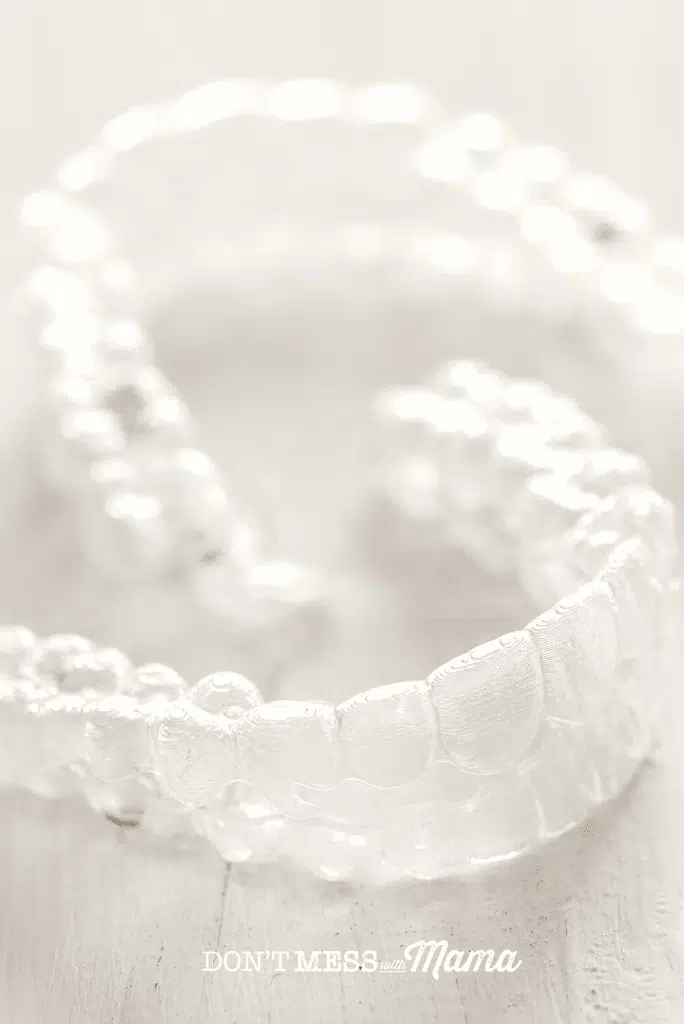
Best Ways to Clean Retainers Naturally
Make a Baking Soda Paste
There are so many uses for baking soda around the home, including cleaning your retainer. According to studies, baking soda has many benefits for oral hygiene, including “specific antibacterial properties to oral microorganisms,” as well as being a low abrasive and effective in plaque removal. It can also help fight bad odors that go hand in hand with a dirty retainer. Not to mention it’s super cheap and easy to source.
Ingredients
- Baking Soda
- Water
Directions
- Rinse the dirty retainer with lukewarm water
- Make a paste with 50/50 baking soda and water. The mixture should be thick enough that it won’t run off your retainer. Alternatively, you can use a natural non-whitening toothpaste (like Thieves Toothpaste).
- Apply the baking soda paste to the inside and outside of the retainer. Gently brush with a soft-bristled toothbrush to clean then rinse with water.
- For best results, make a fresh batch of baking soda paste every time you clean your retainer.
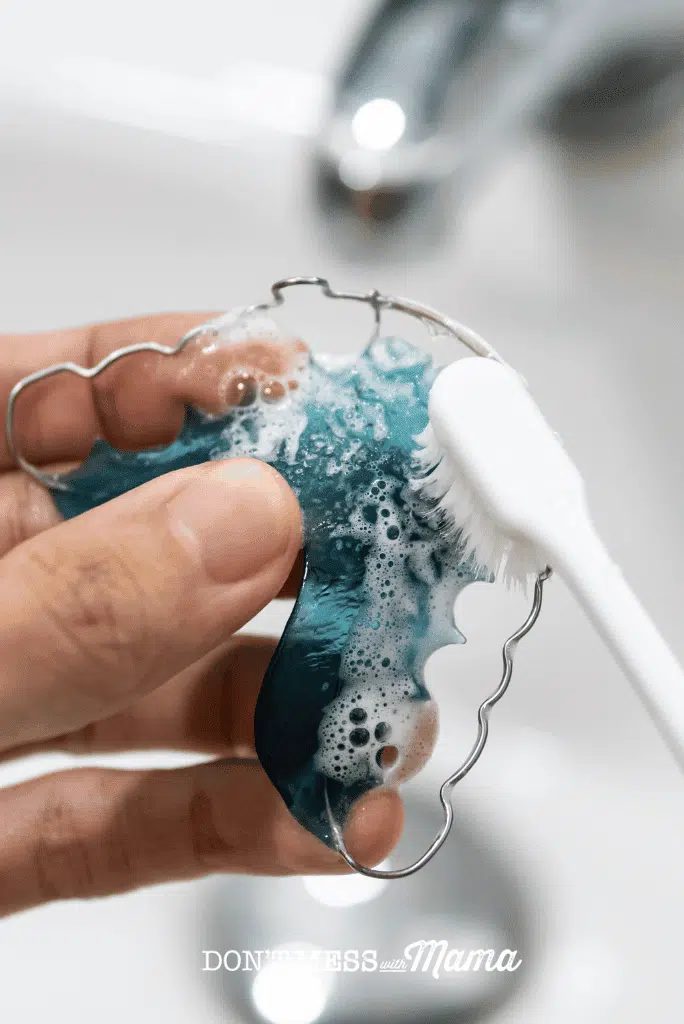
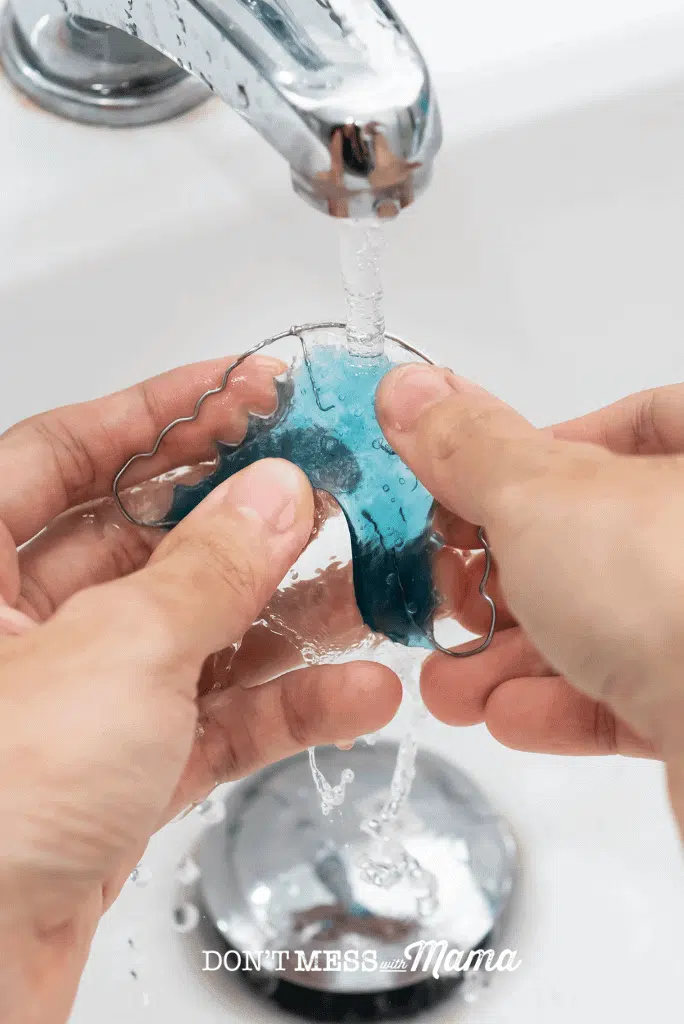
Soak Your Retainer
Retainers can dry out easily and if you let your retainer dry out it will be more susceptible to tartar and biofilm build up and they can bind to it more easily. When not in use, be sure to soak your retainer. Otherwise, it can age prematurely.
Soaking is one of the best ways to clean your retainer and their are a variety of ways to do it. Choose one of these natural soaking solutions to remove bacteria, kill germs, and remove plaque buildup from your retainer:
Soak in Distilled Water
The first way to soak your retainers is by using distilled water. Avoid tap water if possible as it contains minerals that can encourage plaque formation (also known as dental “calculus”) on your retainers. If you choose to soak it in distilled water, it is still recommended to use a more thorough cleaning solution every few days.
Soak in a Vinegar Solution
White vinegar is a natural disinfectant and deodorizer. It is one of my favorite natural cleaning hacks because, once mixed with water, it can effectively remove stains, odors, and bacteria. I use it all over my home, from killing mold to cleaning carpet stains.
It is particularly great for soaking your retainer as it can help to dissolve mineral deposits that may have accumulated. It’s important to avoid using undiluted vinegar as it may be too harsh on the retainer.
Add 1 part white vinegar and 1 part warm water to a bowl or glass. Soak the retainer for 15 minutes, making sure the retainer is fully submerged. Rinse afterwards with cool water.
Soak in Hydrogen Peroxide
There are so many uses for Hydrogen peroxide including using it for cleaning your retainers. Hydrogen peroxide has strong antimicrobial properties, making it effective in killing bacteria and germs present on the retainer’s surface. This helps reduce the risk of infections and oral health issues associated with wearing a dirty retainer. It can also help to break down and remove stains naturally, as well as neutralize unpleasant odors that may develop.
To use, add 1 part hydrogen peroxide with 1 part water to a bowl or glass. Soak the retainers for 15 minutes, making sure they are fully submerged in the solution. After soaking, rinse thoroughly with water to remove any remaining residue.
Use Natural Retainer Cleaning Tablets
You can also purchase natural cleaning tablets. Not only are these non-toxic and safe, but they help to remove discoloration, stains, plaque, stubborn odors, and tartar. Simply drop one tablet in warm water along with your retainers and allow it to soak.
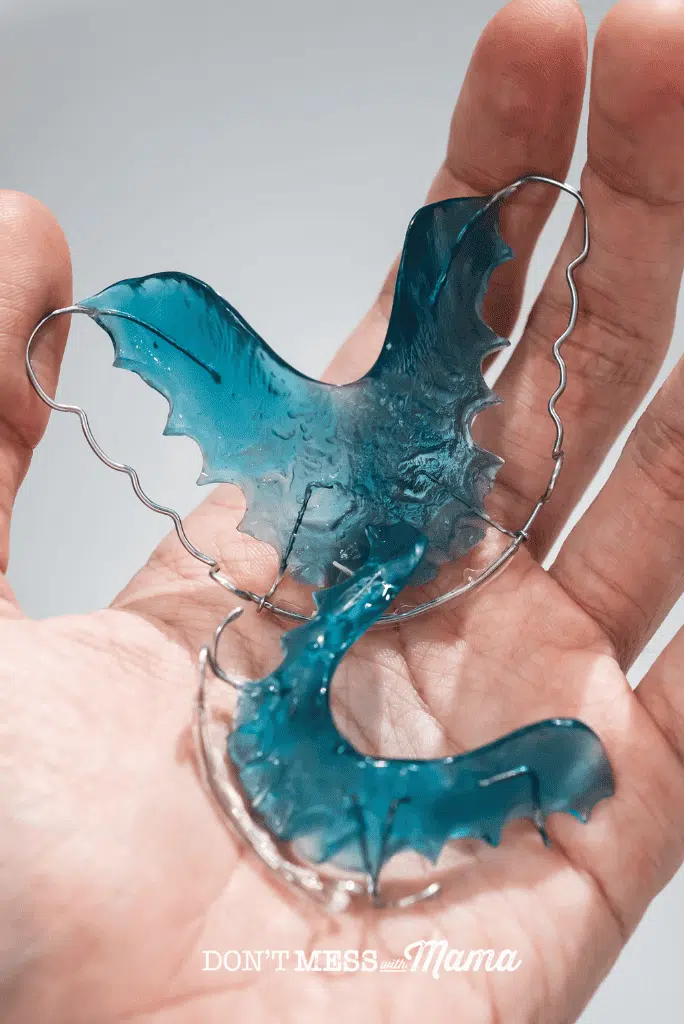
FAQs
What different types of retainers and dental appliances can you clean?
There are 2 different types of removable retainers that you can clean using the methods above. Permanent retainers that are wired, fixed, or bonded to the teeth will be cleaned as part of your usual oral hygiene routine.
- Clear plastic retainers: Clear retainers are removable retainers prescribed after a course of clear aligners like Invisalign. As they are made from plastic they are less durable than other retainers and should be replaced every 2 years (if well cared for).
- Hawley retainer: These are often described as the “classic” retainer. They are made from plastic, acrylic, and metal wires and are usually prescribed after braces. Similar to the clear plastic retainers they are removable but they are more durable. They can last up to 20 years if you take proper care with cleaning.
As well as retainers, you can also use the methods above for other removable dental appliances. This includes mouthguards (such as sports or night guards), snore guards, retainer cases and even dentures. Your orthodontist might have specific cleaning recommendations based on the type of retainer you have and your individual oral health needs. Always follow their advice for the best care.
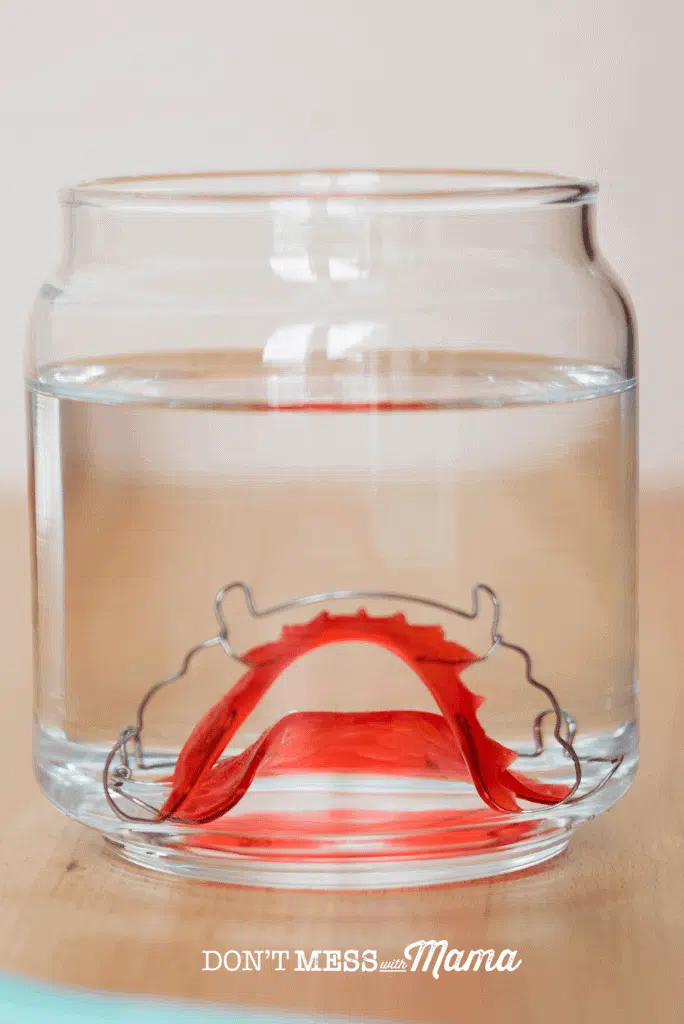
Can I use toothpaste to clean my retainer?
It depends. There are definitely some advantages to using toothpaste. For example, it can help remove stains, bacteria, and plaque buildup from your retainers, leaving them fresh and clean. However, it is only effective if you use natural, non-abrasive, non-whitening toothpaste (like Thieves Toothpaste.)
Some toothpaste can be too abrasive for certain types of retainers, especially those made of soft materials. Over time, this abrasiveness may cause micro-scratches on the surface of the retainer, which means the retainers can become more susceptible to bacterial buildup.
Can I use mouthwash to clean my retainer?
No, most mouthwashes are alcohol-based or contain sodium lauryl sulfate, both of which can dry out your retainer. Using mouthwash can also weaken or deteriorate your retainer over time.
How often should I clean my retainers?
Ideally, you should clean your retainers every day. Just like brushing your teeth, incorporating retainer cleaning into your daily routine ensures they stay fresh and free from bacteria and plaque.
In addition, if you wear your retainers during meals, it’s also advised to rinse them with water immediately after eating. This will help to remove any food particles and prevent bacteria from feasting on the leftovers.
If you don’t have time to clean your retainers every day, I recommend these helpful tips to help you recognize when it’s time to give them a scrub or soak:
- You notice the retainer has a bad taste or smell
- The retainer starts to look cloudy, discolored or has a film.
- After a cold or illness
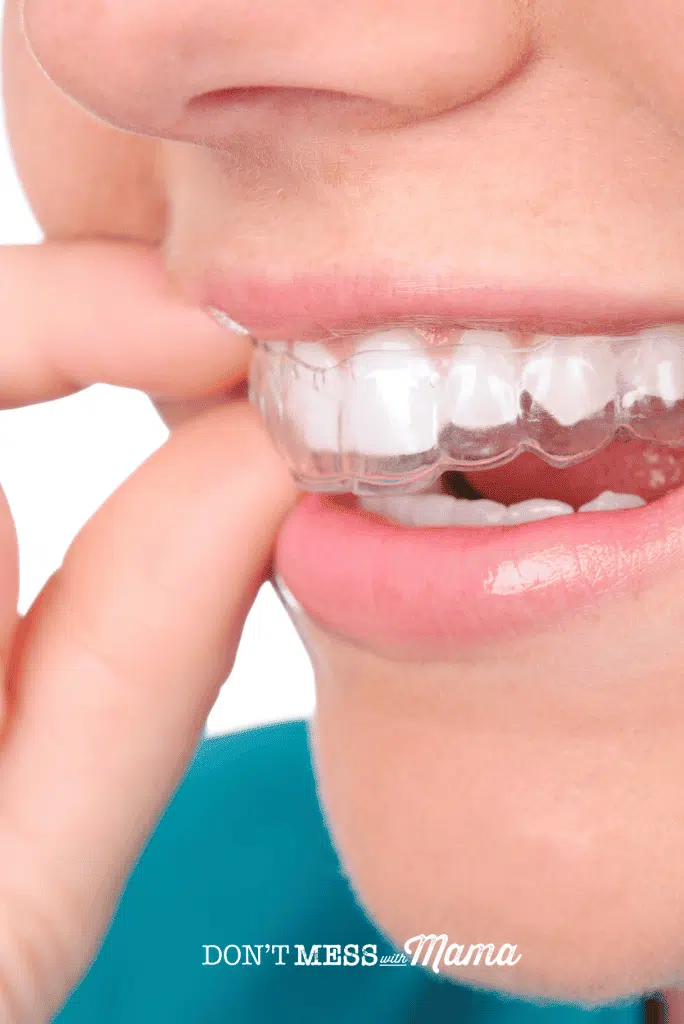
Are these natural retainer cleaners as good as chemical cleaners?
Natural retainer cleaners can be a great option for routine cleaning and maintenance, especially if you prefer to avoid strong chemicals or your retainer is made from sensitive materials. They’ll also save you money and avoid additional orthodontist appointments.
However, I also believe it’s essential to balance homemade cleaning solutions with the occasional use of specialized retainer cleaning solutions. This is because specialized retainer cleaners are sometimes designed to kill a broader range of bacteria and microorganisms.
Always follow your orthodontist’s recommendations for the best cleaning approach for your specific type of retainer.
Helpful Tips for Cleaning Your Retainer Naturally
- Avoid Heat: Don’t use hot water or boiling water for cleaning as it could warp the shape of the retainer. Also avoid leaving your retainer in sunlight to dry as it could overheat or warp the shape of the retainer.
- Avoid Mouthwash: Do not soak retainers in mouthwash as it contains alcohol that could dry out the retainer.
- Don’t Use Chemical Cleaners: Don’t use bleach, antibacterial wipes, abrasive cleaners, or chemical cleaners on retainers.
- Don’t Forget the Case: There is no point in cleaning your retainers then returning them to a dirty case. Keep your retainer case clean too by rinsing it regularly with water and allow it to dry completely before storing your retainers.
More Posts You Might Like
- How to Remove Coffee Stains From Teeth
- 10 Uses and Benefits of Activated Charcoal
- 6 Health Benefits of Oil Pulling + How to do it
Have you tried cleaning retainers naturally? Don’t forget to comment below to let me know how it went. You can also FOLLOW ME on Facebook, Instagram and Pinterest.
Sources:
https://www.medicalnewstoday.com/articles/317894
https://pubmed.ncbi.nlm.nih.gov/29056188/
https://www.webmd.com/oral-health/how-to-clean-your-retainer
